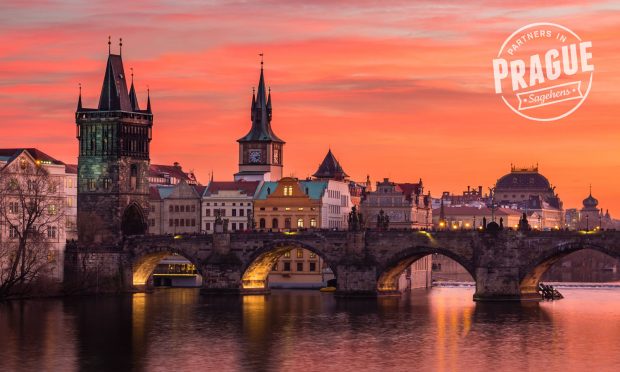
It’s unusual for a U.S. Embassy to have even a single Sagehen, but for three years in Prague, the capital of the Czech Republic, the entire Cultural Section was schooled in the arts of 47.
Erik Black ’95 and Doug Morrow ’01, both career diplomats, arrived together in the summer of 2018. Black, the new cultural affairs officer, had studied in Russia and served two years at the U.S. Embassy in Kyiv following Ukraine’s 2004-05 Orange Revolution. He arrived in Prague fresh from six years at the U.S. Embassy in Beijing. Morrow, his new deputy, had previously lived in Moscow and worked for two years at the U.S. Embassy in Kyiv shortly before Ukraine overthrew pro-Russia president Viktor Yanukovych in 2014.
This is their perspective on the work of diplomacy.
The first time either of us realized we had both gone to Pomona was before we even arrived in the Czech Republic. Doug was still in Iraq and had just received his onward assignment to Prague. “Naturally, I cyberstalked my future boss—then in Beijing—and was both shocked and delighted to learn he was a fellow Sagehen,” he recalls. “Fortunately, I was able to travel a few months later on vacation to China, where we met up for lunch, and I was gratified to discover how much I enjoyed Erik as a person.”
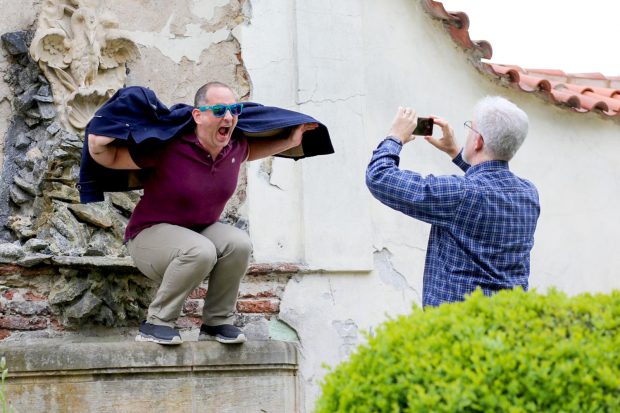
Diplomats don’t have to be serious all the time. Doug Morrow ’01 imitates the bird depicted on the building behind him.
Later, as Russian speakers, we were grouped together in our 10-month Czech language class in Northern Virginia, where we had even more of an opportunity to get to know one another. We had a lot more in common than Claremont; we both had spent time in Russia and Ukraine before the Russian invasion.
“Ukraine was my first assignment in the Foreign Service,” Erik says. “I have fond memories of Kyiv and the wonderful Ukrainian people I was privileged to know. Watching the news each day about the unnecessary destruction in places where I lived, worked, or visited breaks my heart.”
Doug has even closer ties.
“It’s been horrifying to see what’s happening to my friends and colleagues in Ukraine,” he says. “Even though I left in 2013, I’ve been back to visit almost every year since, and have remained close friends with the Ukrainian staff at the embassy. They’ve all had to flee Kyiv, some to Western Ukraine, others to various countries in Europe.”
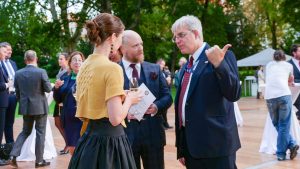
Erik Black, right, during an embassy function while serving as the U.S. cultural affairs officer in the Czech Republic.
What we didn’t realize when we arrived in the Czech Republic—a member of NATO since 1999 and of the European Union since 2004, but once part of the Warsaw Pact—was that most of our time would be spent blunting the impact of Russian and Chinese propaganda and disinformation campaigns. Erik was well attuned to China’s international influence efforts through its Belt and Road Initiative and network of Confucius Centers from his experience in Beijing. Doug was versed in Russian methods from his time in Moscow.
“I thought coming to the heart of Europe would mean a break from China issues after my back-to-back tours in Beijing,” Erik says.
Doug had similar expectations.
“Honestly, I thought this was going to be sort of a break after heading the public affairs section in the Iraqi Kurdistan Region during the middle of the ISIS war, but it was anything but,” he says.
Leading a team of three Czech nationals that included some of the most talented and experienced staff at the embassy, Erik was charged with engaging Czech opinion leaders in a variety of fields: the arts, journalism, higher education, business and civil society.
“Our goal was to better explain American government and society and help strengthen our shared democratic values and ideals among Czechs who have significant influence,” he says.
Doug’s team of four Czechs focused on the nation’s young people ages 14-30, the first generation of voters and workers in that country to have grown up without any memory of authoritarianism.
“The concern was that this lack of direct experience might weaken their resolve to maintain their 32-year-old democracy,” he says. “Before COVID, we started making the rounds to high schools and universities to engage students in discussions on why democracy matters. Polling bore out our concerns: Among the 38 countries that are members of the OECD [Organization for Economic Cooperation and Development], young Czech adults report by far the lowest interest in politics.”
That might have been part of the reason the Czech Republic’s president, who regularly praised authoritarian Russia and China, was re-elected with a comfortable majority in 2018.
We both agreed it was important to have a conversation with Czechs about why our shared democratic values still mattered.
The China Problem
At the time, China had already begun a major influence campaign in the Czech Republic. The Czech president had declared his hope it would become an “unsinkable aircraft carrier” for Chinese investment into the European Union.
A series of state visits, the opening of new Czech-Chinese institutes and Confucius Centers, and attempts to lure Czech students to study in China all created concern in the embassy about long-term Czech commitments to our shared democratic values, as did increasingly favorable poll numbers for China. In response, the cultural team crafted a multi-year campaign to highlight Chinese human rights abuses and the dangers of increasing reliance on Chinese information technology.
The Chinese government did itself no favors. When the progressive mayor of Prague spoke out in favor of Taiwan and Tibet in 2019, the Chinese government retaliated by canceling planned cultural tours by any musical groups that happened to have “Prague” in their name. (In the Czech Republic, high art and classical music are sacrosanct: Don’t Mess with Dvorak.)
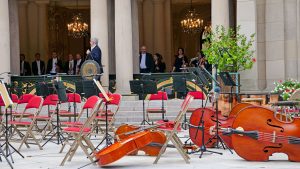
Erik Black ’95, holding instrument at left, organized a concert by the Prague Philharmonic Orchestra at the ambassador’s official residence, upper right, to counter tour cancellations by the Chinese related to the Prague mayor’s support for Taiwan and Tibet.
Erik’s team capitalized by inviting one orchestra blocked by China to perform at the Petschek Villa, the ambassador’s official residence—which happens to be across the street from the Chinese Embassy. To broaden the impact, we arranged for the concert to be broadcast live on national radio. One Czech journalist described the concert as “a totally badass move by the U.S. Embassy.” Combined with other programs, including expert speakers and a nationally touring public photo exhibition documenting abuses against the Muslim Uighur minority in Xinjiang and remembrances of the Tiananmen Square massacre, our teams succeeded in getting Czechs across the country talking about the values gap with China and questioning how close they really wanted to be.
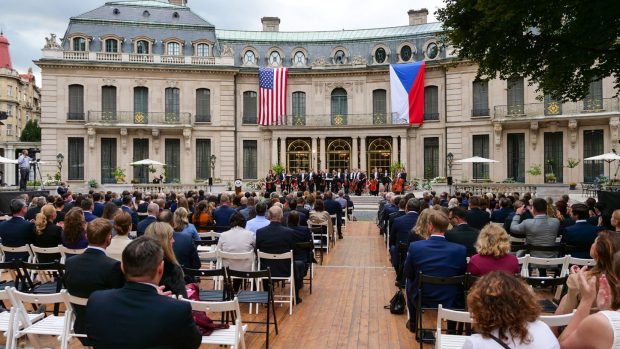
The Russia Problem
Meanwhile, publicly available polling data showed that the far east of the Czech Republic had the highest levels of support for political parties on the extreme left and right wings, groups whose commitment to democratic ideals was questionable.
Ostrava, the largest city in the east, is a rust-belt metropolis suffering from relatively high unemployment and ethnic tension. A flashy Russian Consulate sits on the high street, and a giant Russian tank—a World War II memorial—holds prominent ground downtown on the river. Support for the Communist party was higher there than in any other part of the country.
Situated three hours from the embassy, Ostrava’s residents had previously been difficult to reach, so Doug’s team launched a new American cultural center there as a platform for American speakers, media and other engagement. We found willing partners in the city and region’s leadership, who—with distinct memories of life under a Communist autocracy—understood the risks of ongoing economic stagnation and cultural isolation.
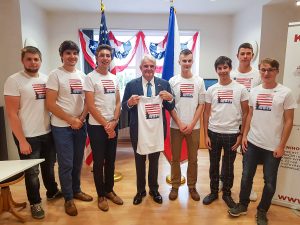
Ambassador Stephen King meets with Embassy Youth Council members at the new U.S. cultural center in Ostrava.
We recruited high school students from the region and across the country to spend a year in the United States with host families so that they could effectively serve as informal ambassadors upon their return, explaining U.S. politics, society and culture in towns and cities unlikely to see a real-life diplomat. In addition, we established a partnership with the local (and impressive) children’s science museum to develop a critical-thinking exhibit to help local children better challenge Russian state disinformation campaigns.
To address the Russia problem with another important audience, Erik’s team worked with Czech alumni of U.S. government exchange programs in 2019 to organize a two-day regional workshop titled “Propaganda and Its Tools in the Post-Soviet Bloc: How to Fight It.” Experts from seven Central and Eastern European countries gathered with fellow European alumni of U.S. government programs in Prague to discuss Russian propaganda, disinformation campaigns and cyber operations, as well as best practices and successful strategies to counter them. The conference attendees, many of whom are in positions of influence within their respective countries, recommitted themselves to working collectively to counter Russian disinformation.
Just as it did with everything else, the COVID-19 pandemic created challenges to traditional public diplomacy efforts, which typically traffic in face-to-face engagement. We had to adapt our programs, turning to Zoom and other tools to reach virtual audiences. When Secretary of State Mike Pompeo visited the Czech Republic during a COVID lull in August 2020—the first high-level official U.S. visit in eight years—we helped coordinate media coverage and engagements with the traveling U.S. press, as well as with the Czech and international media reporting on the trip.
Secretary Pompeo’s visit included a public speech on NATO and European security under growing Russian threats at the “Thank You, America!” monument in Pilsen, which commemorates the U.S. soldiers who liberated Western Bohemia from the Nazis. He also made a major policy speech in the historic Czech Senate chambers calling for greater Western unity in countering growing Chinese influence in Central and Eastern Europe. It was a proud moment for us at the Czech Senate when Secretary Pompeo referenced our effective cultural work in the Czech Republic to influence public attitudes towards China.
By the summer of 2021, our productive three-year Prague assignments—a typical stint in the U.S. Foreign Service—were over. Erik went on to serve a one-year tour as the Cultural Affairs Officer in Kabul, Afghanistan, which included surviving the August evacuation of the U.S. Embassy as Kabul fell.
“I was in Kabul when Taliban forces entered the capital and I evacuated on the last available commercial flight out, escorted by Black Hawk helicopters. The final apocalyptic hours in Afghanistan are seared in my memory,” Erik says. “To save Afghan lives, we rushed boxes of program files to large burning dumpsters behind the U.S. Embassy and destroyed the name placards on every Afghan staff cubicle.”
Evacuated first to Washington, and later to Doha, Qatar, Erik helped with Afghan staff evacuation and U.S. resettlement efforts, registered thousands of Afghan refugees into the U.S. Refugee Admissions Program, convinced Washington to provide funding to cover 120 new graduate scholarships for Afghan female students, and built a new platform in Doha for conducting public diplomacy in Afghanistan. He returns to Washington this summer to work on the China desk for two years as an embedded public diplomacy adviser.
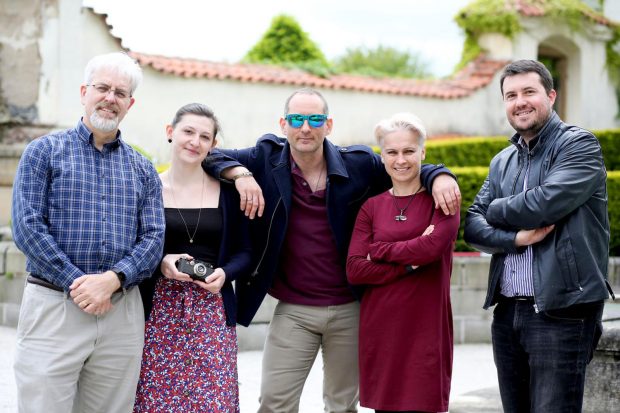
Doug returned to the U.S. for a one-year master’s program in War, Diplomacy, and Society at Chapman University, not too far down the road from Pomona, after which he’ll be returning to Iraqi Kurdistan for a two-year stint. We became close friends during our three years in Prague, and we were grateful for the opportunity to serve our country together in such a beautiful and historic city, on such pivotal issues. On our last day together last summer, we ascended the hillside behind the U.S. Embassy with our Czech staff for pictures at the Glorietta pavilion that overlooks the Vltava River and Prague’s famous Charles Bridge and stands across from Prague Castle. We will miss our amazing team and this beautiful place.
Like most alumni, we know the words on the College Gates almost by heart. We feel gratitude that Pomona opened our minds to new possibilities and put us on the path to diplomatic careers in the U.S. Foreign Service, where we continue to “bear our added riches” for people not only in the U.S., but around the world.
